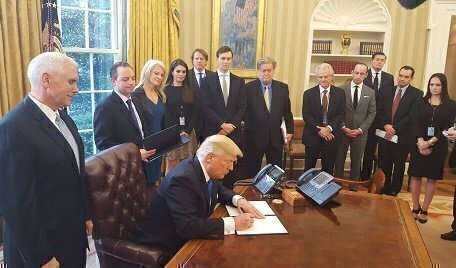The Trump Administration’s legal team indicated on Wednesday that it will take the heated controversy over immigration back to the Supreme Court if government power to exclude foreign nationals is not restored shortly by a federal appeals court.
 The filing in the U.S. Court of Appeals for the Ninth Circuit was the last document due before that court holds a hearing – set for August 28 – on the latest stage in the running constitutional controversy over President Trump’s March 6 executive order restricting the entry of foreign nationals from Mideast nations and of refugees from around the world.
The filing in the U.S. Court of Appeals for the Ninth Circuit was the last document due before that court holds a hearing – set for August 28 – on the latest stage in the running constitutional controversy over President Trump’s March 6 executive order restricting the entry of foreign nationals from Mideast nations and of refugees from around the world.
The Supreme Court is in a recess now, but it has already acted once during the summer on the controversy and would be expected to do so again if the Justices are asked to step in anew.
Although the Justices have agreed to take up in October the basic question of President Trump’s legal authority to issue the executive order, the dispute in recent weeks has focused on the scope of government authority to enforce that order in the meantime.
The Ninth Circuit Court is now pondering the near-term enforcement question in an expedited review ordered by the Justices on July 19. In calling for the new briefs that have now been submitted, the Circuit Court indicated it was not inclined to hold a hearing, thus suggesting it could rule swiftly after the filings had arrived. However, it decided on Wednesday that it would hold a hearing, on August 28.
Its review focuses on two requests by Administration lawyers: first, that the government not be required to expand the list of overseas relatives of U.S. residents eligible to enter the U.S., and, second, that the government need not treat a refugee as eligible to enter if their only tie to the U.S. is a promise of resettlement in this country by a refugee relief agency.
As of now, the Administration does not have permission from the Supreme Court’s temporary order last month to exclude overseas relatives unless they have no “close” family tie to anyone in the U.S. The government puts the emphasis on “close” and thus seeks to exclude, for example, overseas grandparents or grandchildren and cousins. Wednesday’s filing asked permission to enforce the executive order that way.
But the government does have permission from the Supreme Court’s July order to refuse to admit refugees who have only a promise of resettlement. The latest government filing sought reinforcement of that restriction, arguing that the Supreme Court in July made “an implicit determination” that the government will ultimately win on that legal point.
Although the government lawyers see the Justices’ action that way on refugees seeking entry, they do not interpret the Justices’ refusal to allow an expanded list of excluded relatives as any indication that the government will ultimately lose on that point, arguing that the Justices probably had other reasons for refusing to expand that list unrelated to who will win on that point.
Technically, the Circuit Court is focused on what to do about the two disputed factors arising from an order by a federal trial judge in Hawaii, U.S. District Judge Derrick K. Watson. It was his order that the Supreme Court allowed to remain in effect on who among overseas relatives qualified to enter, and it was his order about refugees with a resettlement promise – the part that the Justices temporarily blocked and then referred to the Circuit Court for review.
While the Wednesday filing by Administration lawyers repeated prior arguments about why Judge Watson’s order should be overturned on both points in dispute, the document did suggest that if the Ninth Circuit Court did so, it would then go back to the Supreme Court with that plea.
In the event the Circuit Court does not rule the government’s way, the document asked the three-judge panel to put such a decision on hold pending the outcome of a new appeal to the Supreme Court. Such an appeal, it appeared, would be a separate one from the appeal the Justices have agreed to review in their next term on the question of the Trump order’s validity.
Although the Justices are out of session until the first Monday in October, they are in touch with their staffs and can handle quickly any new request to review the enforcement issue on a temporary basis as they did on July 19.
Legendary journalist Lyle Denniston has written for us as a contributor since June 2011 and has covered the Supreme Court since 1958. His work also appears on lyldenlawnews.com, where this story first appeared.







